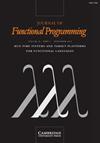Typed dataspace actors
IF 1.1
3区 计算机科学
Q4 COMPUTER SCIENCE, SOFTWARE ENGINEERING
引用次数: 0
Abstract
Video Abstract Absatract Actors collaborate via message exchanges to reach a common goal. Experience has shown, however, that pure message-based communication is limiting and forces developers to use design patterns. The recently introduced dataspace actor model borrows ideas from the tuple space realm. It offers a tightly controlled, shared storage facility for groups of actors. In this model, actors assert facts that they wish to share and interests in such assertions. The dataspace notifies interested parties of changes to the set of assertions that they are interested in. Although it is straightforward to add the dataspace model to untyped languages, adding a typed interface is both necessary and challenging. Without restrictions on exchanged data, a faulty actor may propagate erroneous data through a malformed assertion, causing an otherwise well-behaved actor to crash—violating the key principle of failure isolation. A properly designed type system can prevent this scenario and rule out other kinds of uncooperative actors. This paper presents the first structural type system for the dataspace model of actors; it does not address the question of behavioral types for assertion-oriented protocols.类型化数据空间角色
参与者通过消息交换进行协作以达到共同的目标。然而,经验表明,纯粹的基于消息的通信是有限的,并迫使开发人员使用设计模式。最近引入的数据空间参与者模型借鉴了元组空间领域的思想。它为演员组提供了一个严格控制的共享存储设施。在这个模型中,参与者断言他们希望分享的事实,并对这些断言感兴趣。数据空间将他们感兴趣的断言集的更改通知相关方。虽然向非类型化语言添加数据空间模型很简单,但是添加类型化接口既必要又具有挑战性。如果不对交换的数据进行限制,错误的参与者可能会通过错误的断言传播错误的数据,从而导致本来表现良好的参与者崩溃——这违反了故障隔离的关键原则。适当设计的类型系统可以防止这种情况,并排除其他类型的不合作参与者。本文提出了参与者数据空间模型的第一个结构类型系统;它没有解决面向断言协议的行为类型问题。
本文章由计算机程序翻译,如有差异,请以英文原文为准。
求助全文
约1分钟内获得全文
求助全文
来源期刊

Journal of Functional Programming
工程技术-计算机:软件工程
CiteScore
1.70
自引率
0.00%
发文量
9
审稿时长
>12 weeks
期刊介绍:
Journal of Functional Programming is the only journal devoted solely to the design, implementation, and application of functional programming languages, spanning the range from mathematical theory to industrial practice. Topics covered include functional languages and extensions, implementation techniques, reasoning and proof, program transformation and synthesis, type systems, type theory, language-based security, memory management, parallelism and applications. The journal is of interest to computer scientists, software engineers, programming language researchers and mathematicians interested in the logical foundations of programming.
 求助内容:
求助内容: 应助结果提醒方式:
应助结果提醒方式:


